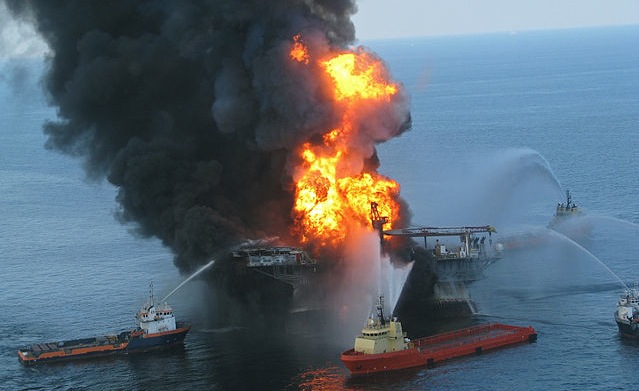English version of Communication indirecte et sécurité: le cas de BP
The oil disaster in the Gulf of Mexico
On April 20, 2010, the Deepwater Horizon oil rig of the British company BP explodes in the Gulf of Mexico. The disaster caused the death of eleven people and a gigantic oil spill. It will take five months to control the leak. BP’s CEO, Tony Hayward, resigned on July 27, 2010. He had headed the British company since 2007.
The explosion is the result of a whole series of technical malfunctions and violations of safety regulations. Cost savings and the unbridled pursuit of profitability have pushed safety issues into the background. For example, just eleven hours before the explosion, a BP representative asked one of its subcontractors working on the platform to replace the drilling mud with seawater. The mud provides a reliable indicator of the progress of operations by evaluating the amount of mud that follows or escapes from the drilling operation. Seawater is more economical than mud, but it mixes with seawater and therefore does not indicate anything.
A disaster does not start when it occurs. If its spectacular and tragic dimension focuses attention on the moment, we must however be careful to place it in a context more deeply rooted in time. BP has made its own investigation report (here, pdf). However, as the report of the independent commission set up by Barack Obama notes, when one reads the BP report:
“It appeared that for BP, the accident happened at 9:49 p.m. on April 20; whereas in some ways, the blowout began in early 2009 when they initially designed the well.” (p.239)
In other words, the investigation report should not be limited to describing the effects but should initiate a search for causes both near and far. Reading the report of the American commission of inquiry is extremely instructive in this respect, especially chapter 8 (here, pdf) that takes a close look at BP’s failures in terms of safety culture.
A poor safety culture
The report goes further back in time to the November 27, 2003 rupture of a gas line from a BP platform in the North Sea. An engineer present at the time of this accident told investigators that “BP was strongly focused on the safety of its personnel and not on the maintenance of its installations”, in particular for cost reasons. In other words, BP’s safety culture was working on one leg: while the UK company was trying to ensure the safety of its employees, it was neglecting the risk management of its facilities.
On March 23, 2005, an explosion at the BP refinery in Texas City killed 15 people and injured 170 others. In addition to the obsolescence of facilities dating back to the 1950s, the investigation revealed serious managerial failures that jeopardize safety:
“BP Texas City lacked a reporting and learning culture. Reporting bad news was not encouraged, and often Texas City managers did not effectively investigate incidents or take appropriate corrective action.” (p.237)

Problem reporting is the basis of the safety culture, which requires commitment from everyone. In the case of BP Texas City, a failure was observed throughout the entire safety chain, from the alert to management, an essentially managerial failure: management does not encourage the return of the negative, nor does it get involved in corrective action.
However, these long-standing BP malfunctions will continue and worsen until the Deepwater Horizon disaster. The U.S. survey notes that 46% of platform staff feared retaliation if they reported dangerous situations. This very high proportion of employees who prefer to keep quiet rather than report a problem is indicative of an authoritarian management and blame culture that is absolutely detrimental to the safety culture.
Lord Browne’s Surprises
If we continue to go back in time, we are moving further and further away from the direct causes of the Deepwater Horizon disaster. The indirect and distant causes may seem negligible, but they contribute to creating a specific environment in which the more direct causes will crystallize. This environment can take on different dimensions, including the intercultural aspect.
In 2010, at the time of the Deepwater Horizon disaster, Tony Hayward was at the helm of BP. He had taken over in 2007, replacing the charismatic and respected Lord John Browne. Lord Browne spent more than forty years at BP, which he led from 1998 to 2007.
Lord Browne resigned following a sex scandal, or more precisely after lying under oath. Having concealed his homosexuality all his life, he suddenly sees his private life spread out in the newspapers. He seeks to have his lover’s confessions banned from publication. During the trial, he lies in court, not daring to admit that he met his lover via a website. This lie is going to cost him his position as BP’s boss.
The Financial Times of June 6, 2012 reports that, during his time as head of BP, Lord Browne told his internal auditors that his “philosophy” for internal control was:
“We don’t like surprises.”
However, British and American internal auditors understood quite differently this statement (for which we have no further information on its context):
- “In Great Britain, managers took this statement to mean that they had to report any critical problems to their superiors.”
- “In the United States, some interpreted Lord Browne’s instructions as meaning that bad surprises should be hidden.”
The same message has given rise to radically different interpretations, as if the British were more likely than the Americans to grasp its exact meaning. Even though it is pronounced in the common language of the British and Americans, the message carries a cultural dimension that alters or modifies its quality. In fact, Lord Browne expressed himself in the indirect mode of communication, which has an implicit dimension that is more easily accessible to the British.
From implicit to explicit communication
Lord Browne’s statement is like a gift package: it’s up to everyone to guess what it contains. This is the danger of implicit communication. It is only understood by those who share the same decoding keys, while it leaves room for interpretation – and therefore for error – to those who don’t have the same cultural norms and references.

As it stands, this statement contains several ambiguities. Indeed, what does the use of the verb “to like” in the negative form mean? To like is a subjective judgment about which there can be endless debates about one’s tastes and colors. Associated with the pronoun “we”, it can give rise to various appreciations. Who is this “we”? The company? Lord John Browne himself (in a form of a royal “we” from a “lord”)? The British compared to the Americans (in a sense of: “we, the British, don’t like surprises”)?
And what is a “surprise”? Generally, there are people who “like” surprises because they expect something positive, and there are people who “hate” surprises because they have had bad experiences with them. So there are those who hope for surprises and those who avoid them. You can see how ambiguous this term is when addressing the company’s internal controllers.
If we place Lord John Browne’s statement in this precise context, we must then reduce its indirect dimension by specifying its own words:

But in doing so, we have only clarified its expression; we have not transformed the indirect and implicit message into a direct and explicit message. If Lord Browne had wanted to express himself directly and unambiguously in order to be understood by his American internal auditors, he could have done so as follows:
You must alert to any looming problem. If you don’t, the company and yourself will face serious consequences!
So we see different semantic levels appearing which were contained in Lord Browne’s statement in the manner of an origami. It is the spectrum of communication that goes from indirect to direct, from implicit to explicit, and from high context to low context:

I chose the case of BP to show that it is not necessary to refer to Asians to highlight the implicit dimension of communication. This can be manifested in many other cultural regions. The question is whether this is a more pronounced tendency among the British than among the Americans. It is true that most Americans have a much lower tolerance for ambiguity.
That said, other factors may have an impact on the preference for indirect communication, such as the fact that John Browne, Baron of Madingley, belongs to the aristocracy. Family background, noble status and social distinction through culture and language may develop a particular taste for indirect communication.
The most important point here is to note how much direct communication in low context must be imposed in activities with high safety stakes. For example, I can bet that many of you would not be reassured to board a plane where the captain would have said to his co-pilot: “I don’t like surprises”.
To go further, read on this blog The surprise effect, or the enemy of cross-cultural communication
Quelques suggestions de lecture:
- Communication indirecte et sécurité – le cas de BP
- Working with the French – feedback from the field
- The surprise effect, or the enemy of cross-cultural communication
- Le troisième côté de la barrière – ou la dimension culturelle du risque
- When details are monumental – 4 cross-cultural edifying stories
- Working with the French: 17 foreigners from 12 countries share their experiences


Derniers commentaires